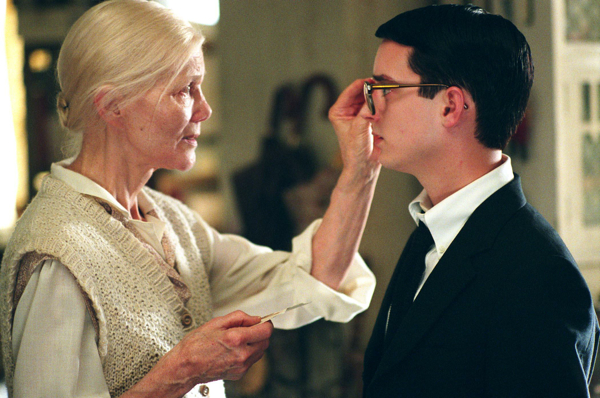Movie review by Greg Carlson
In adapting Jonathan Safran Foer’s 2001 novel – which deals with more history and more characters than the film version – actor-turned-filmmaker Liev Schreiber pares down the story to a rattling skeleton. The mostly disappointing result is a straight-ahead WWII memory piece, in which an American nebbish visits Odessa and the surrounding countryside in search of the woman who saved his grandfather from the Nazis in 1942. The quest for the long-vanished Ukrainian shtetl where these events took place impacts the young man’s two guides as much as himself, and the division of our attention among the trio somewhat diminishes the film’s potential.
Elijah Wood plays Foer as a blank introvert, content to hide in his somber black suit and blink at the world through the thick lenses of his oversized glasses. A meticulous collector of seemingly insignificant, personal ephemera, Foer enshrines all sorts of odds and ends in plastic bags that end up pinned to his wall. Along with his grandmother’s dentures, Foer acquires a faded photograph of his grandfather with a woman known as Augustine. Deeply curious, he decides to make the trek to the former Soviet territory in search of answers about this mysterious savior.
In sharp contrast to Foer is his oddball translator and tour guide Alex (Gogol Bordello frontman Eugene Hutz), a hip-hop obsessed Michael Jackson fan whose fractured English provides the lion’s share of the movie’s humor (he refers to his grandfather’s dog as his “seeing-eye bitch”). Alex’s grandfather (Boris Leskin) runs a modest business playing chauffer to American Jews who take family history-tracing vacations, and he masks his contempt for the tourists by pretending to be blind. Leskin presents the most fully formed character in the movie, and his quiet presence is a welcome contrast to the humorless Foer and the vulgar Alex.
Schreiber divides the film into five chapters, a tactic which reinforces the book-like experience but inadvertently douses any feelings of wonder and surprise – two traits in short supply and sorely needed. That Alex dubs the adventure “a very rigid search” is a painfully accurate description of the proceedings. Even more disconcerting is Schreiber’s heavy-handed and indelicate integration of comedy. With the exception of Alex’s often hilarious mangling of expressions and phrases, the movie relies too heavily on the dog. Veering from broad comedy to teary-eyed revelations about the past, “Everything Is Illuminated” is too diluted to pack much of a punch.
Schreiber handles most of the technical aspects of the film with confidence, and Matthew Libatique’s cinematography attractively showcases the outdoor locations. Many viewers, however, might take issue with the way in which the climactic discoveries unfold; the timing and emphasis of a number of shots confuse rather than shine light on the events of the past. The film version withholds anything that might come across as too grim or distressing – an earnest choice, but a decision that mutes the emotional force. Patient viewers who stay for the end credits are treated to Gogol Bordello’s “Start Wearing Purple” – a delightful song from a soundtrack of well-chosen tunes.
